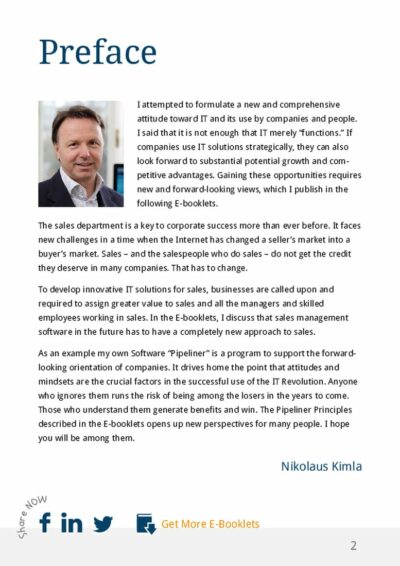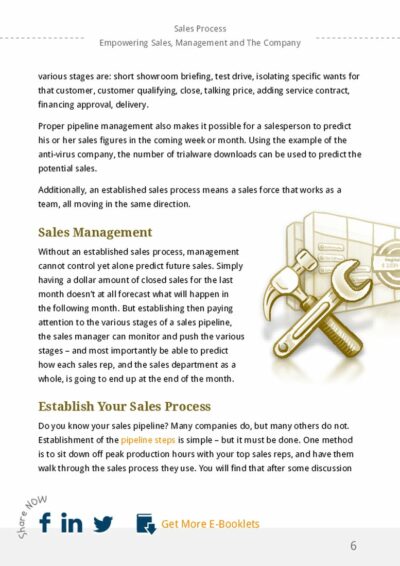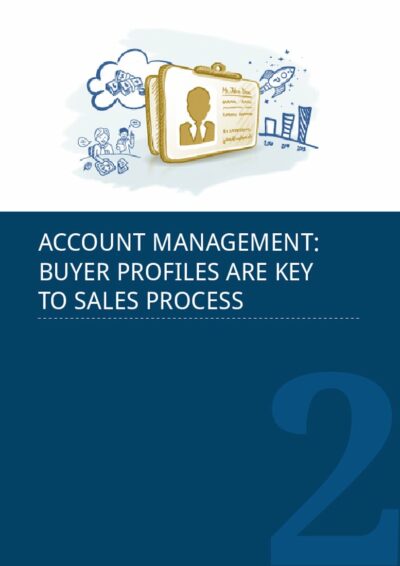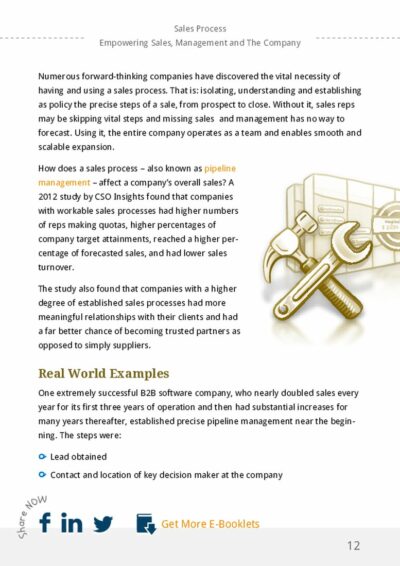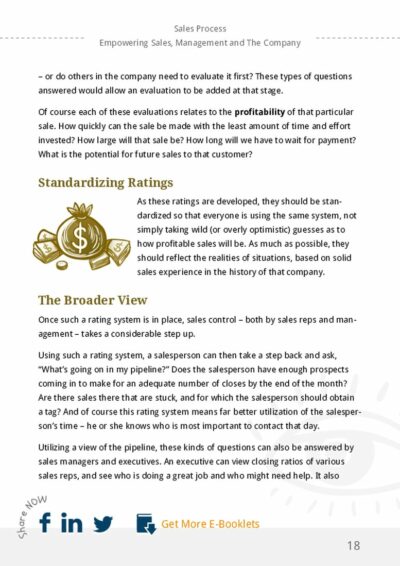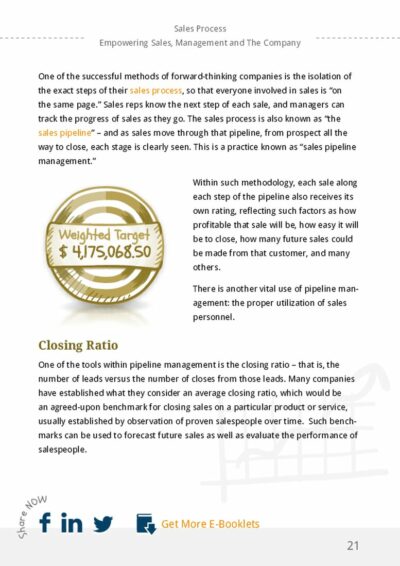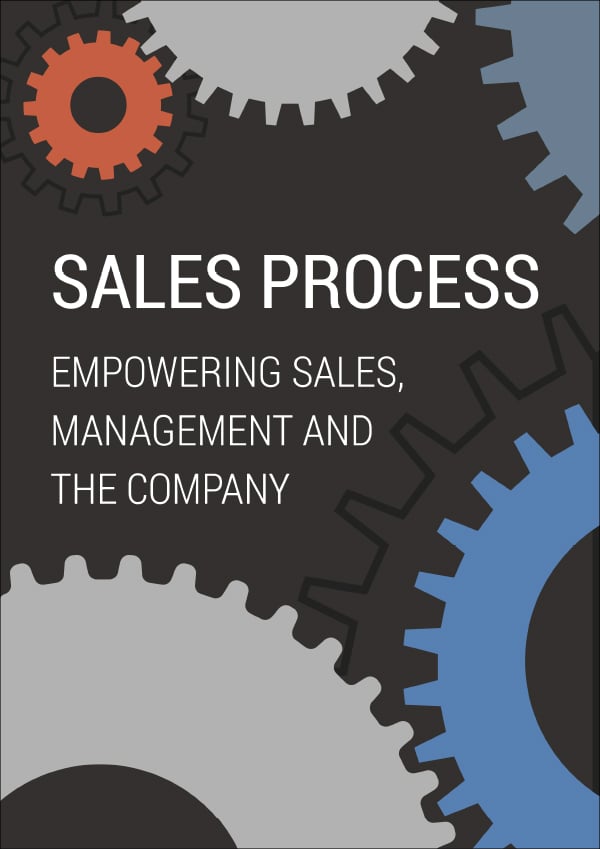
Sales ProcessSales Process Sales Process is a series of strategic steps or a set of activities aimed at driving sales growth through the alignment of personnel, market insight, methodologies, relevant business units, and technology.: Empowering Sales, Management, and the Company
How important is it for a company to both have and understand its sales process? It’s not just important – it’s crucial to sales coordination, management and company expansion. A company’s sales process is the precise series of steps through which a sale passes, from prospect through to close. A sales process could also be referred to as a “pipelinePipeline Sales pipelineis a visual representation of the stage prospects are in the sales process.” through which all your sales run. For example, one B2BB2B B2B is an acronym for Business-to-Business, a model for selling, relationship-building, or engagement. software company uses a fairly common pipeline model of leadLead Lead refers to a prospect or potential customer (who can be an individual or organization) that exhibits interest in your service or product; or any additional information about such entity., demo, booking, and close as individual steps, and each of these steps are monitored.
How do you determine the stages of your company’s process? You can’t set sales pipelineSales Pipeline Sales Pipeline is a type of visualization showing the status of each sales prospect in the customer life cycle or sales process. management on the right track until you’ve gathered, correlated, interviewed, and established a foundation on which to build.
In this eBook you will learn and be able to act confidently to get this important first step done right.
Chapter 1: Know Your Sales Process
While a salesperson very familiar with a company’s productProduct Product refers to anything (an idea, item, service, process or information) that meets a need or a desire and is offered to a market, usually but not always at a price. or service may be able to operate without established pipeline management, it is doubtful anyone else will. An established sales process means a sales force that works as a team, all moving in the same direction.
Chapter 2: AccountAccount Account refers to a record of primary and background information about an individual or corporate customer, including contact data, preferred services, and transactions with your company. Management: BuyerBuyer A buyer is an individual or organizational entity that purchases a product or subscribes to a service. Profiles Are Key to Sales Process
Today, savvy salespeople are learning that a great pitch and some information on the target customerCustomer Customer is an individual or an organization that purchases a product or signs up for a service offered by a business. company and their needs no longer cuts it. Today’s account management wins come from digging in and fully understanding a company, their requirements, and the specific target personnel and their jobs.
Chapter 3: Sales Process: Real-World Examples
How does a sales process – also known as pipeline management – affect a company’s overall sales? A 2012 study by CSO Insights found that companies with workable sales processes had higher numbers of reps making quotas, higher percentages of company target attainments, reached a higher percentage of forecasted sales, and had lower sales turnover.
Chapter 4: Sales Process Stages: Focusing on profitabilityProfitability Profitability is the potential, degree, metric, ability or relative efficiency of a business to yield financial gain (i.e., profits) after all relevant expenses and costs have been deducted.
Exactly isolating your sales process – the precise steps taken by your sales reps from prospect to close – is crucial to your company’s operation. But once you have done so, how can you then use that dataData Data is a set of quantitative and qualitative facts that can be used as reference or inputs for computations, analyses, descriptions, predictions, reasoning and planning. to focus sales attention and predict future sales? This is the essence of utilizing the stages of your sales process.
Chapter 5: Sales Process: Utilizing Sales Personnel
There is another vital use of pipeline management: the proper utilization of sales personnel.
Chapter 6: Importance of the Sales Process–Outside of the Sales Pipeline
The firm establishment of a sales process, closely reflecting specific real-world sales actions that move sales from prospect to close, is vital to a company’s smooth operation and expansion. But not only is such establishment needed for salespeople and sales managers – it is also quite important for other individuals and departments outside of immediate sales pipeline management.
Learn More About Pipeliner CRM
Take a no-obligation 14 day trial of Pipeliner CRM.
No credit card info required – just experience for yourself how it could impact your sales.
Additional Resources
This ebook is on the subject of “Win Together.” It falls under the same context as“win-to-win” described in my book Network Selling: Guarantee Success for the Digital Age. Today, this aspect of sales is more important than ever, and must also be part and parcel of CRM solutions.
“For some years I’ve been saying that, as a society, we’re in the midst of a transformation. Given what’s happened in the last couple of years, there’s no one left who is disagreeing with me! It’s become very obvious.”
 Nikolaus Kimla, CEO at Pipelinersales, Inc.
Nikolaus Kimla, CEO at Pipelinersales, Inc.A common term in sales today is EQ, which stands for “emotional I.Q.” It means the skill a salesperson has in reading emotions and utilizing them in sales. It means empathy and a number of other abilities. The short version is, it’s an I.Q. when it comes to emotions. But just as with our Network Selling model, E.Q. isn’t just for sales, either. It’s actually the missing factor in human interactions, for confrontation—a common “tool” in human interactions—doesn’t actually handle anything.
“You can have everything in life you want if you will just help enough other people get what they want.”
 Zig Ziglar
Zig Ziglar
